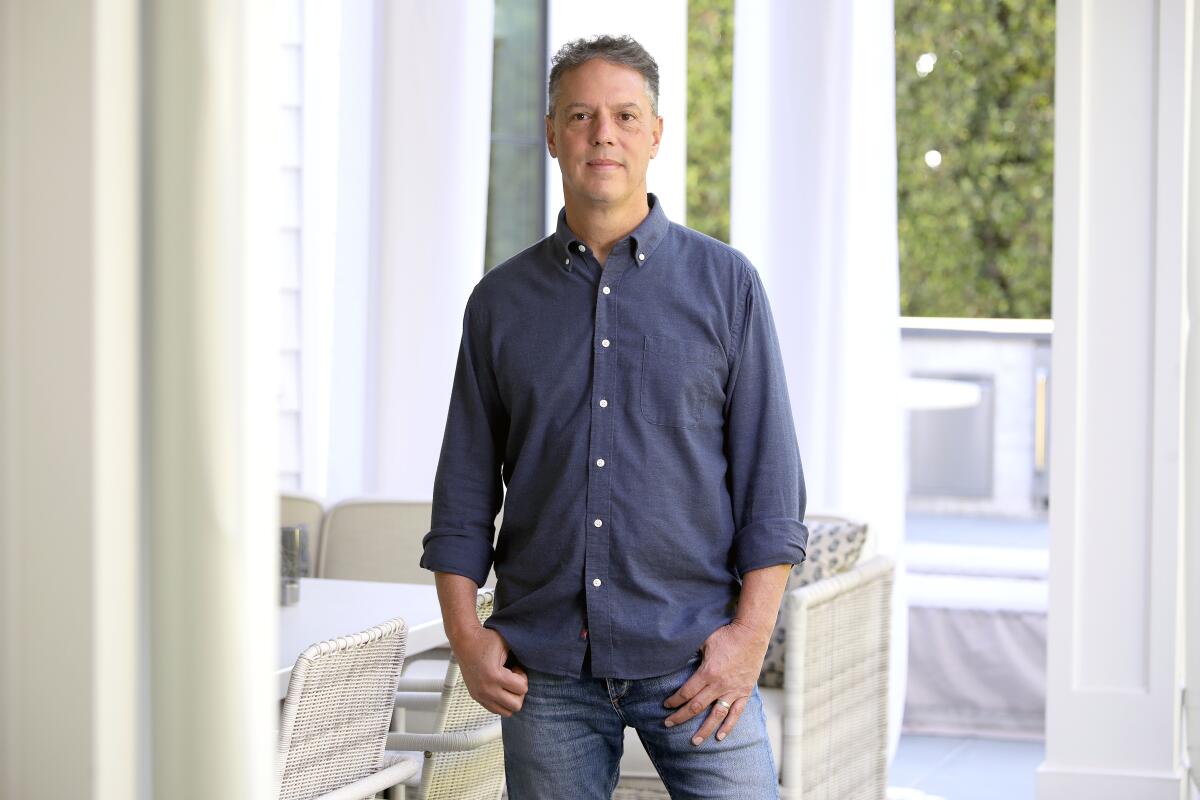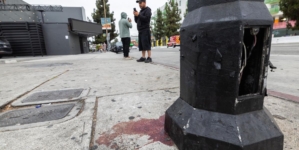-
A genetic test could predict the odds of obesity, allowing for early interventions - 13 mins ago
-
Government Prioritizes National Workforce Over Foreign Employees - 30 mins ago
-
Plane Crashes Into Dhaka School Campus - 36 mins ago
-
Athletics vs. Guardians Highlights | MLB on FOX - 45 mins ago
-
Prince Harry’s Invictus Games aims to heal royal rift: report - 53 mins ago
-
Government Condemns Syrian Violence and Pledges Aid to Christians - about 1 hour ago
-
Social Security Payments: Checks Worth up to $5,108 Going Out This Week - about 1 hour ago
-
Angels vs. Phillies Highlights | MLB on FOX - about 1 hour ago
-
Open Water Swimmers Make History with Triple Podium Finish at World Championships - 2 hours ago
-
NORAD Fighter Jets Stage Show of Force Near Russian Border - 2 hours ago
A tech billionaire vows to make homeless housing affordable and profitable
A call for proposals to develop a surplus Metro property on the corner of Wilshire and Crenshaw boulevards drew bids from seven heavyweights in the world of homeless housing.
Along with big non-profits like Abode, PATH and Bridge Housing, an eighth bidder — one that has yet to produce a single apartment — presented a bold plan to do what none of the others could.
Better Angels, a nonprofit founded by a billionaire tech entrepreneur who has turned his attention to homelessness, said it will build 212 affordable units on the property, plus a medical office building, without needing a dime of taxpayer money.
Unlike the other bidders, whose proposals rely on tax credits and other government grants, Better Angeles says it will supply 30% of the capital as equity and finance the rest with conventional loans, allowing it to build faster and at much less cost than typical affordable projects.
Among several homelessness initiatives launched by its founder, Adam Miller, Better Angels has set out on an ambitious mission to debunk the conventional wisdom that affordable housing can’t be produced without taxpayer subsidies.
“The goal is to show the way to make money doing affordable housing because we believe that … the only way you are going to solve the affordable housing crisis is by letting capitalism work,” Miller said.
With a $300-million investment fund, Miller is trying to lure for-profit developers away from the luxury market and create an opportunity for small-scale developers to think beyond duplexes and ADUs.
Concurrently with its Metro proposal, Better Angels is bidding on a project to redevelop a former Kaiser Permanente facility in Pasadena. It proposes a housing and mental health hub with a mix of 300 market rate, affordable and supportive units for formerly homeless people.
It also has entered a bid in a Los Angeles Community College District competition for proposals to produce student housing. If selected, it would build a 54-unit apartment near Sunset Junction in Silver Lake for Los Angeles City College students with preference for those in or exiting foster care.
Better Angels hopes to build a 54-unit apartment near Sunset Junction in Silver Lake for Los Angeles City College students with preference for those in or exiting foster care.
(Onyx Architects, Inc.)
Metro and LACCD have announced that winners will be named this summer. Bidding on the Pasadena project closed in May, and a decision is expected sometime this year.
Win or lose on those bids, Better Angels is backing two smaller projects that are well on their way to completion. A groundbreaking will be held in later this summer for a 51-unit apartment that will replace an abandoned single-family home in South Los Angeles. Later in the year, permits are expected to be issued for an eight-story, 72-unit building a block from Manchester Avenue in Westchester.
Miller promotes his housing model as an alternative to the decades-old system of double subsidies that use tax credits supplemented by other government grants to finance construction and rental subsidies to support ongoing operation.
Tax-credit development is slow and costly because the rental subsidies have to be secured before capital can be raised, and the financing can be a years-long process involving competitive applications to multiple agencies. All the while the developer, in most cases a nonprofit homeless services provider, accrues carrying costs for the land.
By providing capital up front with the stroke of a pen, Better Angels potentially cuts years off the process.
“It’s a very uncomplicated structure,” said Anthony Gude, lead developer of the Westchester project. “You don’t have to use public subsidies. That makes the capital stack simpler and more reliable.”
Gude said the 72-unit project will cost $15.5 million. At $215,000 per unit, that’s roughly a third of the current cost of construction financed with tax credits.

An artist rendering of Better Angels’ planned eight-story, 72-unit building a block from Manchester Avenue in Westchester.
(DeMaria Design)
But there is a trade-off for the savings in time and cost. Though classified as affordable, the project will not become part of the homeless housing system. To be profitable, its rents will exceed the very low level needed to get people directly off the streets. As part of the approval process, Gude committed to limit rent of 55 units at low income (for people making 80% of area median income) and 15 units at moderate income levels. On average, that would be about $2,000 for the low-income units, he said. While that would be roughly 40% lower than rents in other new high-rise buildings going up in the bustling area just north of LAX, it’s well above the very-low income levels required of tax-credit projects.
That differential is evident in the applications for Metro’s Wilshire/Crenshaw project. Better Angels’ Metro proposal would provide 170 units at 80% of the area median income and 42 units at 110% of median, the latter a level commonly known as workforce housing.
The seven competing proposals, all using tax-credit financing, would have some units available for people with incomes of only 30% of the median, considered acutely low-income, and most below 60% of the median.
André F. Bueno, Better Angels’ director of housing and chief investment officer, said the goal is to create new housing with guaranteed affordability that would serve homeless people directly through master leases to nonprofit agencies or, if not master leased, indirectly by renting to people who have federal Section 8 vouchers but can’t use them in the competitive rental market.
Miller described it as a homeless housing with “downside protection.”

Adam Miller, a software developer, is experimenting with a new way to prevent homelessness, giving out no-interest micro loans to people who are facing imminent eviction through his 1P Foundation in Los Angeles.
(Gary Coronado / Los Angeles Times)
“We have flexibility to ensure our limited partners get their return,” he said. “We’re trying to prove out that there is a different better way to do this that is less costly to the government and more effective at creating housing.”
Miller, who built Cornerstone OnDemand into a global training and development company, turned his focus on philanthropy after its 2021 sale.
After forming an organization that supports research seeking solutions on gun control, Miller and his wife Staci Miller turned their attention to homelessness as their primary local mission, creating the STEP Fund, a no-interest, forgivable micro-loan program to help people facing evictions. It has given out 700 loans with a return rate of 65%.
In 2023, the Millers incorporated Better Angels United Inc. as the umbrella for several initiatives. It conducts Resource Days around the county to help homeless people connect with services. It also employs a technical team working to create a mobile phone app for outreach workers and a centralized shelter database.
After the Los Angeles fires, Better Angels built a resource navigator app and set up a relief fund.
Its Affordable Housing Fund is a for-profit subsidiary of Better Angels created to attract capital to develop affordable housing.
“We expect the returns on these projects are going to be market rate — double-digit internal rate of return — and we think that is going to encourage a lot of other people to get in this space and build net new affordable housing,” Miller said.
Miller is planning to promote three types of housing. About 45% of the fund will go to standard new housing construction. Another 20% will be invested with Good River Partners, whose founder Daniel Heimpel aspires to build housing for youths transitioning out of foster care.
With the remainder, Miller hopes to partner with housing developer and modular manufacturer SoLa Impact to help longtime South Los Angeles homeowners convert their properties into multi-family apartments.
“The idea is not only to create new affordable housing but to provide an opportunity for intergenerational wealth with people in the neighborhoods,” Miller said.

Andrew Slocum, a market-rate developer, is purchasing this abandoned building to build an affordable multi-family apartment in South Los Angeles.
(Dania Maxwell / Los Angeles Times)
Gude and Andrew Slocum, who is leading the project in South Los Angeles, said their plans were possible only because of state and local incentives for affordable housing, including Mayor Karen Bass’ Executive Order 1 that streamlined approvals.
Among the other bonuses, the five-story building in South Los Angeles and the eight-story building in Westchester require only minimal setbacks from the street and no parking.
“We needed every lever that was pulled,” said Gude.
Source link































